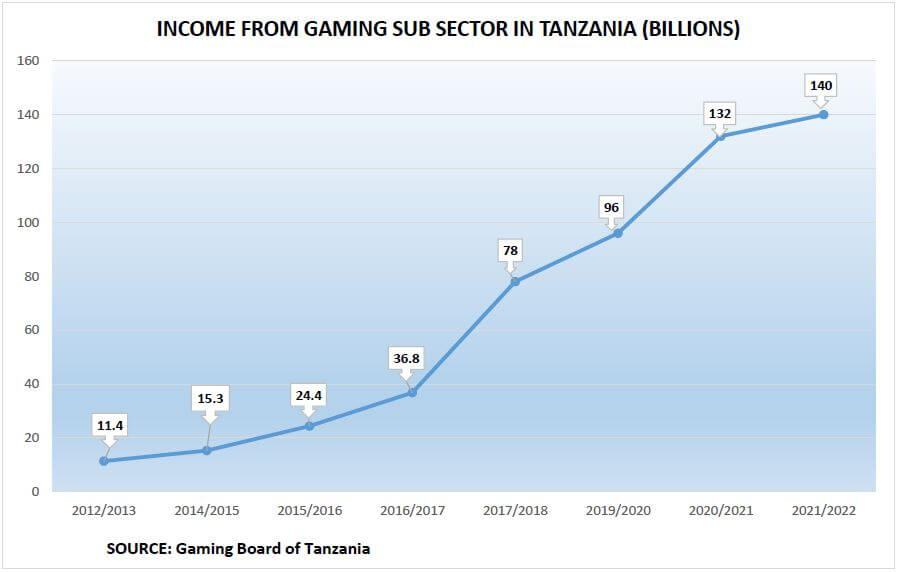In Tanzania’s vibrant streets and neighbourhoods, an increasing number of young people are pinning their hopes on striking it rich through virtual gambling. This aspiration has become more attainable than ever, thanks to the convenience of betting at one’s fingertips. In the palm of many Tanzanian hands, you’ll find a mobile phone device that makes gambling accessible wherever you are.
Juma Fundi, a 27-year-old university graduate, pointed out that “the rise in the number of people turning to betting is a direct consequence of unemployment; for some, betting has become a primary source of income.
Some individuals rely solely on betting and have no other means of livelihood.” His sentiment resonates with many others, like Joyce Mfuko, who observes that “you encounter young people with memberships in all six betting groups; their entire aspirations are tied to betting, hoping to hit the jackpot.”
However, Louis Mushi, a dedicated advocate for youth, believes there’s more to this story. Louis noted that the government’s revenue collection from the betting industry has exacerbated the problem. “Between 2012 and 2015, the government amended the sports betting laws and introduced online casinos.

They agreed that the government would deduct a 6 per cent tax for every bet placed by an individual. If someone wins, the government takes 18 per cent. Since then, there has been a proliferation of betting companies in Tanzania,” he explained.
Mushi argued that “the government, which blames the youth for excessive betting today, did not consider the addictive nature of betting or how the high unemployment rates might push young people into this addictive behaviour.”
The Betting Scene in Tanzania
Tanzania’s betting industry is booming, with numerous bookmakers capitalizing on this lucrative market. Prominent names in the industry, such as Betika, Betway, Sportspesa, Bikosports, and 1XBet, have established a strong presence. This surge in competition has raised the bar for services offered to customers, including a wide range of sports betting options, from football and cricket to boxing and athletics.
Online sports betting has gained immense popularity in Tanzania, offering benefits like live betting, user convenience, privacy, and enticing bonuses and promotions. The top betting sites in the country provide competitive odds and attractive jackpots, enhancing the excitement of the experience.
In a nation where the merits and drawbacks of the betting business are hotly debated, one thing is clear: the industry’s impact on Tanzania’s youth and economy is a complex issue that requires thoughtful consideration and potentially further regulation.
Increasing numbers of Tanzanians are concerned that gambling addiction is on the rise, partly due to the easy availability of affordable betting. Similar to other addictive behaviours, the question arises of whether to regulate the supply side by imposing restrictions on betting or on addressing the demand side by educating the public on avoiding addiction and other betting-related issues.
Revenue Trends
The Gaming Board of Tanzania (GBT) plays a crucial role in regulating and monitoring the gaming sector in the country. According to data from the GBT, the government is reaping substantial benefits from the betting industry. The local media outlet The Citizen reported revenue from the gaming subsector reached 140 billion Tanzanian shillings, up from 132 billion in the previous year.
Previous data from the GBT shows a consistent upward trend in the industry’s growth. In the 2012/13 fiscal year, the government collected 11.4 billion Tanzanian shillings in taxes from gaming activities. This figure steadily increased, reaching 15.3 billion in 2014/15. The upward trajectory continued, with tax revenues progressively rising to 24.4 billion in 2015/16 and further surging to an impressive 36.8 billion in 2016/17.
The fiscal year 2017/18 witnessed a significant revenue intake of 78 billion Tanzanian shillings, highlighting the growing prominence of the gaming industry. Finally, in the financial year 2019/2020, revenue from gaming activities reached its peak, totalling an impressive 96 billion.
This remarkable increase underscores the gaming sector’s significant role in contributing to the government’s revenue streams during this period.
As of 2022, information from the board reveals that sports betting companies are taxed at 25 per cent, SMS betting is taxed at 25 per cent, each slot machine incurs a charge of $43.11 US dollars, the national lottery is taxed at 20 per cent, and machine sites are taxed at 25 per cent.
Physical casinos face an 18 per cent tax, while digital casinos are taxed at 25 per cent of revenue after winnings. The combination of high taxation and the increasing volume of betting generates substantial revenues that may influence the regulation of the industry.
In conclusion, the rise of online gambling in Tanzania has brought both economic benefits and concerns about addiction among the youth. Striking a balance between regulating the industry and addressing the underlying socio-economic issues remains a challenge that requires careful consideration and informed decision-making.


